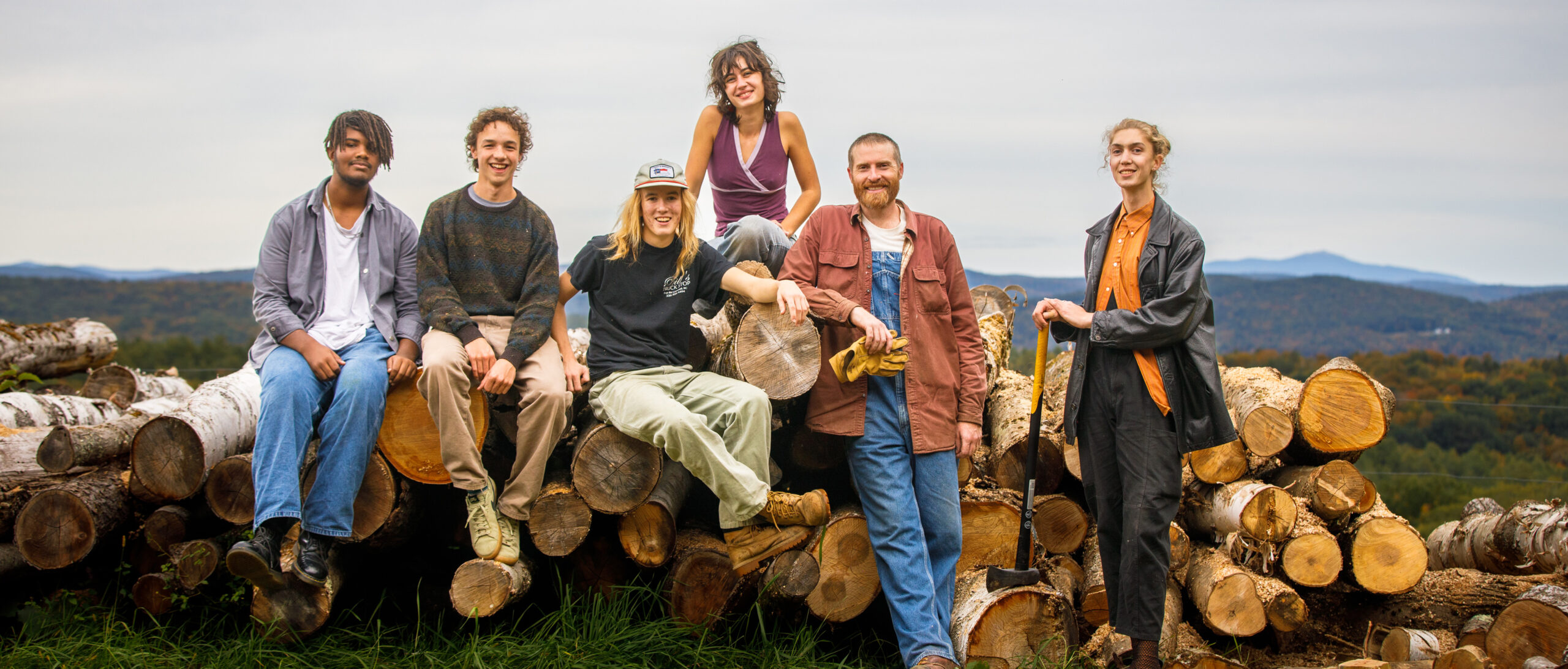Afternoon Work activities meet once or twice a week. They are group activities that a student does in addition to their normal job as part of the 6-day Work Program.
Conservation Crew - Land Use
The Putney School campus sits atop 600 acres on a beautiful hillside in Vermont. Our campus is and has been used for many purposes since its founding as a farm school and care has to be taken to give back as much as we take from the land. A part of living in community on the land involves stewardship as stated in one of Putney’s Fundamental Beliefs: To steward and protect the land, to seek ways to live on the earth that are healthy for all beings, and to shape our community as a model of sustainable living. This activity will give students the opportunity to get to know our beautiful campus in a more intimate way as we work to remove invasive species, maintain trails, cultivate student gardens (pollinator garden, edible forest garden, herb garden, and KDU roof garden), and work on monitoring long-term ecological studies in our woodland campus. We will often collaborate with a professional forester as we work to conserve our land in a way that meets everyone's needs. GIS (Geographic Information Systems) mapping work will also be a part of this afternoon as we continue to add to the electronic data of our campus.
Carpentry
Basic carpentry skills are introduced including the use of hammers, saws, measuring tapes, levels, and squares. Students assist in ongoing repairs and construction projects on campus.
Community Service
Students do a variety of volunteer work, such as assisting senior citizens with yard work, picking vegetables for the Vermont Foodbank, and doing trail maintenance with the Putney Conservation Commission. Other options may be available, based on students’ interests.
Farm - Land Use
Students are engaged in all aspects of running a diversified farm. Activities may include: fencing, haying, sugaring, animal husbandry (cows, chickens, sheep, pigs, turkeys, etc.), building, and clearing land.
Garden - Land Use
Growing food locally and sustainably is an important way to address global environmental issues. It is also a rewarding and enjoyable way to connect with the earth that sustains us. The work in this activity varies seasonally. In the spring the work involves seeding, transplanting, and work in the greenhouse. In the fall, time is spent harvesting and preserving veggies, flowers, and fruits.
Kitchen
Students work in the kitchen preparing dinner for the entire school. They are introduced to such basic kitchen skills as handling a knife and preparing salad and learn cooking techniques such as sautéing, steaming, boiling and roasting. Duties may also include cleaning and stocking. Students are expected to maintain a professional level in terms of cooking skills, cleanliness and high food-quality standards.
Maintenance
Reality and its practical applications are given the hands-on approach in this activity. Carmelita Hinton’s work ethic versus the Victorian school of condescension toward dirt under the fingernails is at the heart here. Entropy, creating order out of chaos, a priori philosophical constructs, and how to unclog a sink drain are all part of learning “grunt” work at Putney.
Recycling
Recycling is an active activity, responsible for collecting and monitoring our recyclable waste. Students rotate through the buildings collecting recyclables and keeping the collection areas as sanitary and organized as possible. More than just collecting cans, the purpose is to educate the community about the reuse and recycling of waste.
Sheep and Garden - Land Use
The Sheep and Dye Garden Activity meets in the fall and spring trimesters. Students care for the sheep, including cleaning their pen each week and assisting with trimming hooves and shearing. Students will also wash fleeces in preparation for hand spinning and tend the dye garden. This includes growing plants, weeding, and harvesting dye materials. Students will have the opportunity to dye Putney fleece and yarn with the dye plants that we grow.
Sustainability Crew
The newly revised Sustainability Activity puts students in the front seat of sustaining and improving the environmental stewardship of the Putney community. Students facilitate the reduction of excess materials into our campus waste stream by managing elements of the composting and recycling programs, contributing directly to the process of reimagining what a sustainable school can be. Students will be implementing new ways to improve the conservation systems in place. This may include design, construction, art work, conducting interviews, creating proposals, or working alongside other groups as we consciously pursue the best means to realize our school’s fundamental belief: “To steward and protect the land . . . and to shape our community as a model of sustainable living.”
Theater Tech
This activity is responsible for the physical elements of the current play in production. We build and paint the sets and fixtures, design and install lighting and so create the magical elements that are part of theater production. The students are included in the design concept and give input toward that end. You will also learn how to use both hand and power tools, to mix colors and paint scenery.
Theater Lighting Tech
This activity is responsible for the soundscape and lighting elements of the current play in production. We train carefully and work with a variety of technical equipment. Technicians practice task execution on cue to create an immersive theatrical experience with the stage performers. You will also learn how to "run the board" for assembly.
Woods Crew - Land Use
This activity involves both firewood preparation and forest management. Students share responsibility for producing and transporting sufficient firewood for a number of heating stoves on and near campus, as well as the wood-fired baking oven in the school dining hall. This is a rigorous outdoor activity that acquaints students with Putney’s wood lots, teaches them responsible stewardship of the land, and instills in them a sense of self-reliance in a rural setting.


